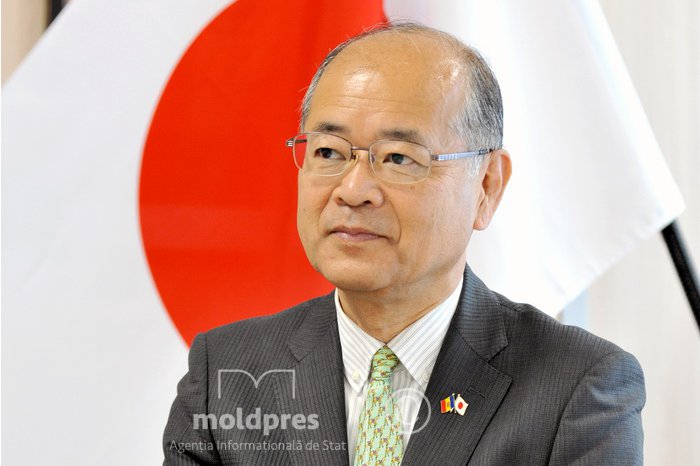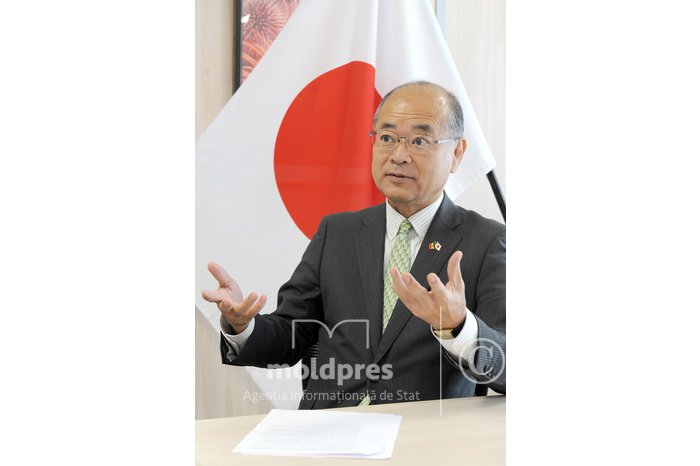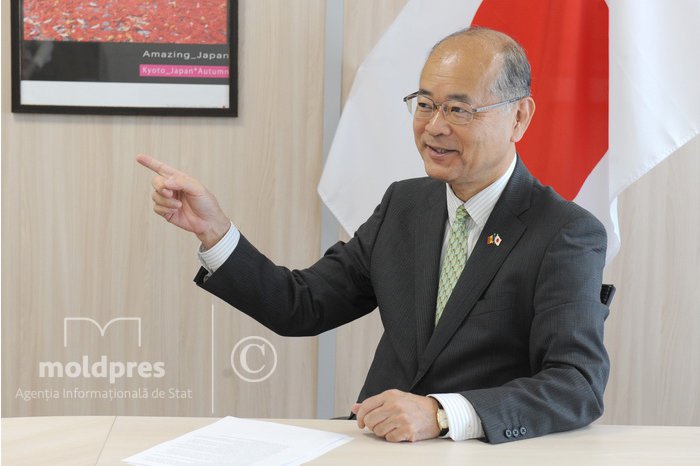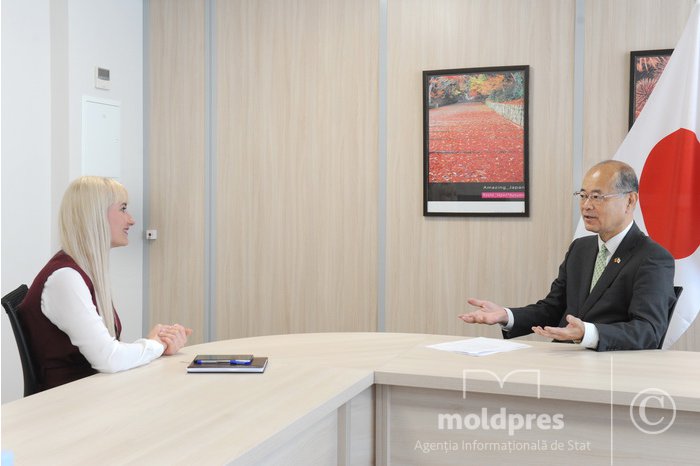Japanese Ambassador says he is happy that equipment donated by Japan helps enhance competitiveness of Moldovan products
18:44 | 16.09.2022 Category: Interview, Event
Ambassador of Japan to Moldova Yoshihiro Katayama has given an interview with the MOLDPRES State News Agency on topical subjects, the bilateral relations and the investments made in Moldova.
MOLDPRES: You acted for a while as diplomat in Romania and you were able to watch the situation in our country from quite near. How the situation has changed in Moldova in these 31 years of independence? Is the current course towards EU only an aspiration or a well-established goal which can be achieved?
Yoshihiro Katayama: In July 1981, I started by diplomatic career in Bucharest; ever since then, I know that there is a nation, beyond the border of Romania, which speaks the same language. Nevertheless, on that period, I did not have access to this zone, but I always had great interest in the Republic of Moldova. I visited the country for the first time in 2005, a period when I worked in Kiev as adviser on economic issues. I came here with the greatest pleasure, I saw that the Republic of Moldova is very nice country, I liked the country’s capital very much, which is a green and beautiful city; at that time, my dream from the beginning of 1980s came true. Subsequently, in the beginning of the 2020 year, I was appointed ambassador of Japan in Chisinau, which made me hugely happy. In particular, I liked the rich presence of Japanese vehicles and the fact that two prestigious companies from Japan: Sumitomo Electric and Fujikura Automotive MLD made substantial investments here and created more than 6,200 jobs. On this period, I watched a change from the democratic viewpoint, which became a priority for the authorities. As for Moldova’s integration into the European Union, there are already accurate facts; I mean the increase in the volume of export to EU, which is two thirds of the overall volume. At the same time, Moldova received the status of country candidate for accession to EU; the government worked much for this. I consider that the European Union is a natural way of Moldova’s development.
MOLDPRES: How do you assess your mandate in our country, which was marked by the COVID-19 pandemic and the refugees’ crisis?
Yoshihiro Katayama: Indeed, practically my entire mandate was on the pandemic period and in last February, the war in Ukraine started. Even in such situations, the embassy must work in continuation and provide the fellow countrymen with the support needed. Since the beginning of the mandate, I was set to know more people from the government, from the culture sector, media and teachers. Thus, we hosted more important events, with the observance of the sanitary norms. During them, we exchanged opinions and learned the situation in Moldova. On this period, we managed to continue implementing important projects, as well as to initiate new ones. In last February, we opened the centre of digitization at the National Library of Moldova (BNRM); in the same month, we organized a concert in which a Japanese conductor performed. A sad aspect was the fact that, because of the pandemic, we cancelled several cultural events; we took the decisions with difficulty, as the Moldovan people have a major interest in the Japanese culture. As for the conflict in Ukraine, it continues; we keep a close eye on the situation and provide the fellow countrymen with the protection necessary. Following the conflict’s outbreak, several groups of experts came to Moldova to assess the situation and the needs; subsequently, we ruled to provide financial support to buy medical equipment both for the refugees and the local citizens.
MOLDPRES: Japan is the third biggest donor of Moldova, after the USA and EU. A support worth 26.54 million dollars was allocated for the agricultural sector, increasing the production on foreign markets. Following the investments made, how the export of Moldovan products to the domestic market of Japan evolved and which are the most competitive products in this respect?
Yoshihiro Katayama: Each time, before deciding the sector for the assistance for development, we talk to the local partners. Following discussions, we established that agriculture is a quite important branch for the country’s economy. Thus, we provided the resources needed, so that Moldova is able to buy new technology. Based on the reports unveiled, we were able to watch how these donations contribute to the country’s economy and I am glad that we see good results in this respect. I am happy that this equipment help enhance the competitiveness of Moldovan products on foreign markets. Certainly, the Moldovan wines are quite appreciated, but not at the existing potential. I think that there is an even larger space for sale. In the last ten years, the presence of Moldovan wines has been enhanced much on the Japanese market and the efforts should continue to this end. At the same time, we hope that the variety and quality of Moldovan products will grow on the Japanese market. Thus, in 2025, an international exhibition will be organized in the Osaka city, in which Moldova is to participate as well, where more products of the country will be presented and an exchange of experience will be made.
MOLDPRES: In 2020, an agreement was signed on the delivery of medical equipment worth about 800,000 dollars. In last August, a new agreement on the implementation of the programme on consolidation of the medical system from Moldova, worth 7 million euros, was signed. What medical equipment is to be purchased and how many medical institutions of the country will benefit from it?
Yoshihiro Katayama: Just as in other cases, colleagues of Moldova’s government informed us about the medical needs. Thus, within the project from 2020, equipment of medical imagistics (radiography and computerized tomography) was bought for the Valentin Ignatenco Municipal Clinical Hospital for Children and the Emilian Cotaga Republican Clinical Hospital for Children. As for the project from this year, with the starting of the war in Ukraine, I saw that many refugees started coming here and the Moldovan government and people received them with much care. We kept an eye on the situation; subsequently, three delegations of specialists came here to establish the fields in need of emergency assistance. Following analyses, we came up with an urgent decision to provide assistance in the medical sector for buying equipment due to be used both by refugees and the Moldovan citizens. Within the project, equipment for radiography, ultrasound and dialysis is to be procured. It will be delivered to the Holy Trinity Clinical Municipal Hospital, Timofei Mosneaga Republican Clinical Hospital, Emergency Medicine Institute, Mother and Child Institute and the Oncological Institute. Our specialists saw that you have good and well-trained physicians; just only medical equipment is necessary and therefore we came with this assistance.
MOLDPRES: One of the most valuable projects for the cultural heritage, initiated with Japan’s support, is the digitization of the National Library, for which 400,000 dollars was earmarked. What is the stage of the project’s implementation and how necessary is for the modern world, culture and education to go through the digitization process?
Yoshihiro Katayama: Moldova has a vast culture and the National Library of Moldova is the institution which holds a lot of books, documents and other materials, which must be preserved for the next generations. This cultural wealth can be saved through digitalization. The decision to provide this equipment for the setting up of a digitization centre at the library was discussed with colleagues of the Moldovan government. The ceremony of the centre’s opening took place on 23 February 2022, on Japan’s National Day. The equipment has been already set and presently specialists work for copying materials. At the same time, in this way, teachers and children from other settlements, not only from Chisinau, will have easier access to them.
MOLDPRES: We know your passion for sports dance and the fact that you represented Moldova at international competitions. What feelings did you have when you were wearing the tricolor of our country on back?
Yoshihiro Katayama: I played football at lyceum, and after graduating from the faculty, I became diplomat. I married at the age of 23 years and I and my wife have four children. When I was appointed adviser on economic issues at the embassy of Japan in Kiev, my wife had to stay in Tokyo, as the children were studying at school there. Thus, in July 2004, I left alone. At that time, far from family, I ruled to eat soundly and go in for sport. Accidently, I discovered the sports dance; I started training just like a hobby. Afterwards, in April 2008, I was transferred from Kiev to Bucharest and started participating in diverse contests there. At an international competition, I saw the performance of dancers from the Codreanca band and I had a shock. They were so well-trained. At that time, I remembered well the band and the country it represents. In early 2020, I was appointed Japan’s ambassador to Moldova and I came to Chisinau in February. I dared to make a visit to the band and I was quite lucky to be received at Codreanca, where I make trainings with a woman. It is an honour for me to be a member of this band of dances, which is one of the most prestigious bands from all over the world. Following trainings carried out during two years, I ruled to take part in competitions and doubtlessly I registered as a dancer member of Moldova’s Sports Dance Federation. It was natural for me to do this. For me, it is a great happiness to represent Codreanca and Moldova, I feel a lucky dancer.
MOLDPRES: How would you present Moldova and its people to your fellow countrymen?
Yoshihiro Katayama: Till several years ago, the Japanese did not know too much things about Moldova and when the war in Ukraine started, the Japanese media unveiled the situation as to the conflict and the refugees. In such a very tragic situation, Moldova became quite known as a neighbor country of Ukraine, which immediately received refugees. This was regarded quite positively. Without compensations or other conditions, Moldovan families started receiving refugees at their homes, which is an impressive fact. Therefore, I would like to tell the fellow countrymen that Moldova is a very nice country with a hospitable and friendly people, who reacted to such a difficult situation in a special way. I would like more Japanese people to visit Moldova, as you have a quite beautiful country, with places worth being visited by Japanese tourists.
MOLDPRES: Mr. Ambassador Yoshihiro Katayama, thank you for the kindness to give this interview with our agency.




